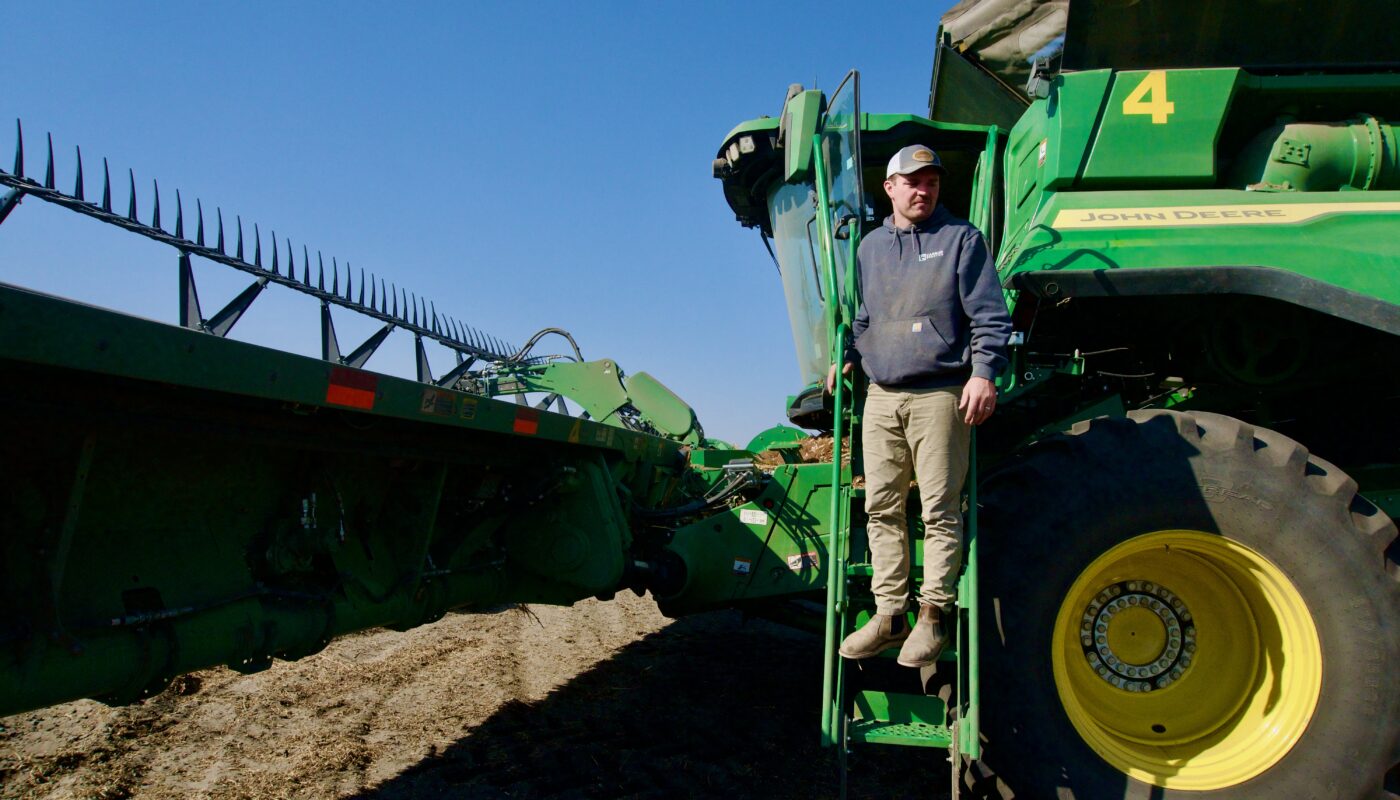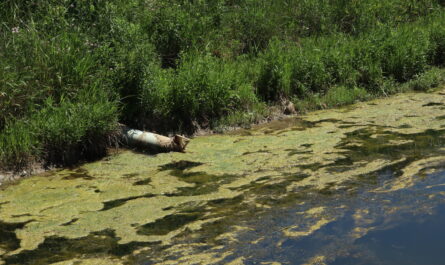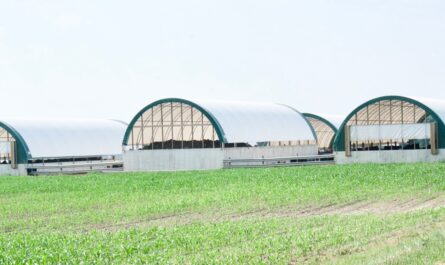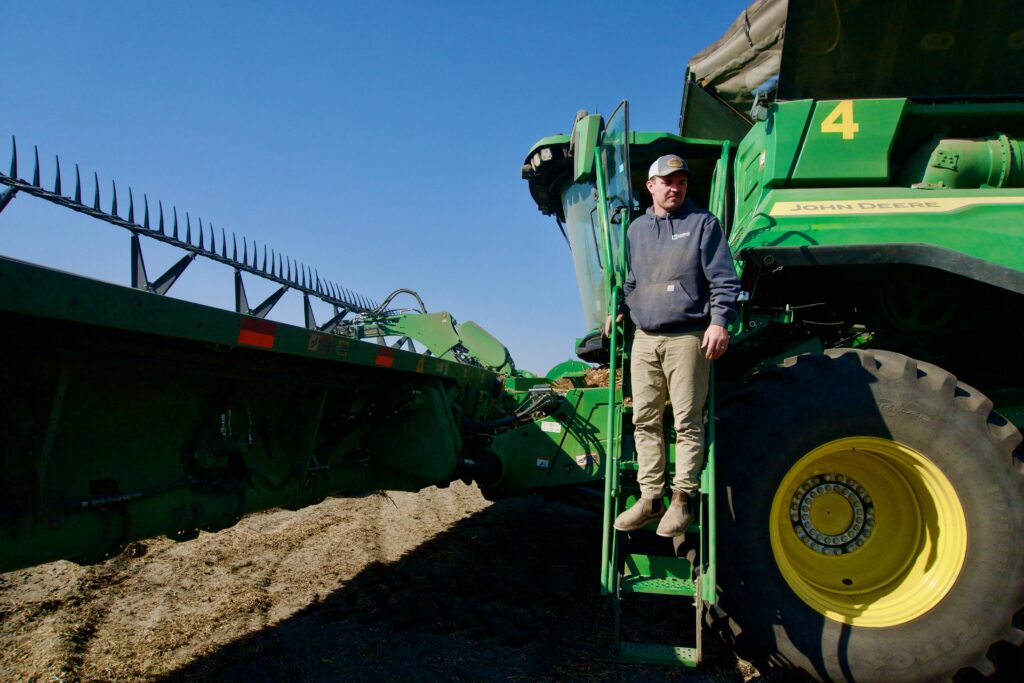
WEST BEND, Iowa – People who think seriously about how to limit the toll industrialized American agriculture takes on communities, land, and water ought to visit the Fehr family’s organic Clear Creek Acres in northern Iowa.
With just shy of 800 residents, West Bend is barely a blip on a prairie landscape, but it has become home base for an uncommonly large expanse of organically grown crops- operations that have found success in challenging the popular convention that pesticides and other agricultural chemicals are needed to feed the world.
Towering grain bins are surrounded by close to 50,000 acres of corn, soybeans, oats and other crops grown without the use of synthetic chemicals. Farmers fertilize the land with chicken litter and hog manure and weed much of the land by hand, or with non-chemical tools, such as new laser weeders.
What’s occurred here since 1998, when farmer Barry Fehr experimented with raising chemical-free soybeans on 45 acres, is the development of the most expansive and profitable area of organic grain production in Iowa, and possibly the United States. Most of the land is farmed by multiple generations of Fehr families in the area. Clear Creek Acres is one of those Fehr families and farms about 25,000 acres, about half the organic acreage, and generates nearly $40 million a year in crop sales. The family also manages about 3,000 organic acres in Colorado.
The agrochemical industry, led by Monsanto-owner Bayer, Syngenta and other global seed and chemical giants, maintains that weed killers, insecticides and other pesticides are essential to robust food production, and that a growing global population requires use of the chemicals in agriculture.
But 71-year-old Dan Fehr, who has been farming more than 50 years, says “that is debatable.”
The Fehr family farms are nearly matching the yields of crops grown conventionally, perhaps seeing only about a 10% yield decline in comparison, Fehr said. Their costs are lower because they’re not buying pesticides and the high-priced genetically modified seeds designed to be used with certain weed killing pesticides.
And the prices they reap are higher because organic crops command premiums in a marketplace where consumer demand for organic foods is climbing.
“The premium we got from selling organics is the key reason,” said Fehr. “The demand for organic has definitely grown a lot. That is why we do it.”
And, he added – “Nobody has died of not using pesticides. I don’t think it will hurt anything not to use pesticides.”
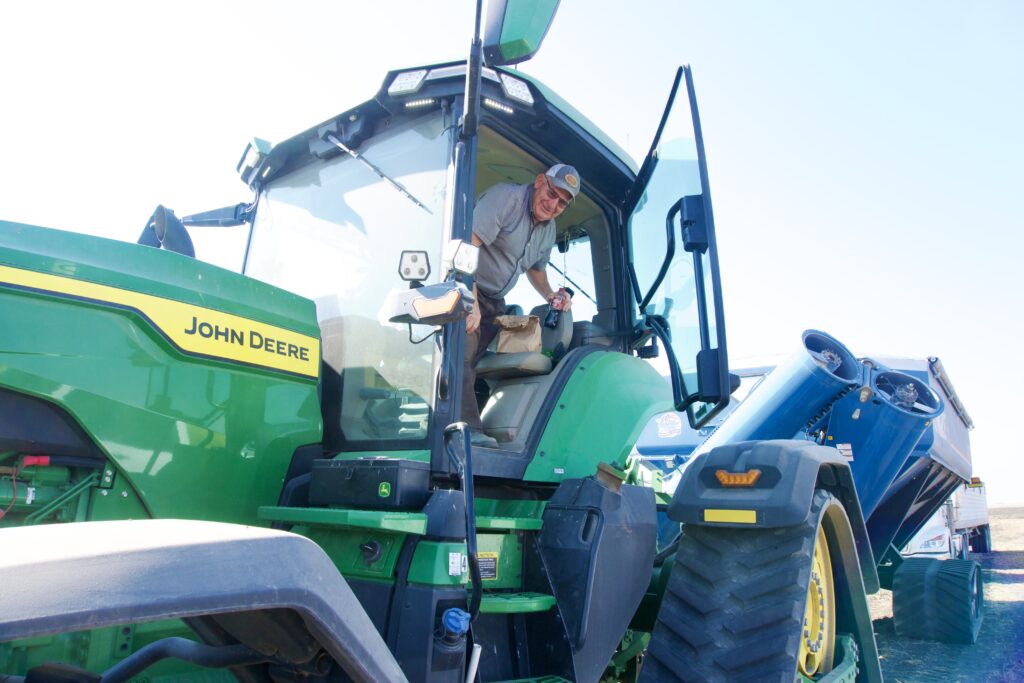
In short, the Fehrs developed an environmentally safer and more lucrative farming system that serves as a challenge to chemical grain production, and an invitation to conventional farmers to consider switching practices designed to build soil, stem pollution, and generate sufficient income to convince every member of their family to keep farming.
“They are unique in the way they run their operation,” said Cole Thompson marketing director of Minnesota-based Albert Lea Seed, the nation’s largest organic seed producer. “Most people in the industry think you can’t farm at this scale organically. But you can. They’re proving it.”
Not Everyone Impressed
While the family’s achievements are celebrated in the country’s growing organic farm sector, not everybody in Kossuth and Palo Alto counties, close to the border with Minnesota, are impressed. Critics here say the Fehrs do not purchase chemicals and other supplies from local farm dealers, nor do they store and ship grain from local elevators. Their cultivation practices, designed to control weeds, keep the surface of thousands of acres bare, making top soil vulnerable to erosion from wind and rain. And the $500 per acre fee the Fehrs are willing to pay to rent farmland is twice the common rate, and is seen as an impediment to young people trying to start farm careers.
“They aren’t doing much for this community, I’ll tell you that,” said Joe Joyce, who farms 2,000 acres here with chemicals.
“It’s just jealousy. That’s all,” countered Linus Solberg, a farmer and Palo Alto County commissioner. “I tell people anybody can do it. Anybody here has the opportunity to raise organic crops if they want to put in the time. These guys have figured out how to do it.”
As just about every organic farmer in America can tell you, planting and harvesting crops without the protections from insects, weeds, and disease provided by chemicals is no easy feat.
But a growing body of scientific evidence has shown the chemicals come not just with benefits, but also with an array of risks.
Many types of common farm pesticides have been scientifically shown to cause cancers and other diseases, are harmful to the environment, and are known to cause extensive water pollution. Iowa, in particular, suffers from extensive farm-related water pollution, and cancer is prevalent. Indeed, Iowa has the second-highest and fastest-rising cancer incidence among all US states, according to a 2024 report issued by the Iowa Cancer Registry.
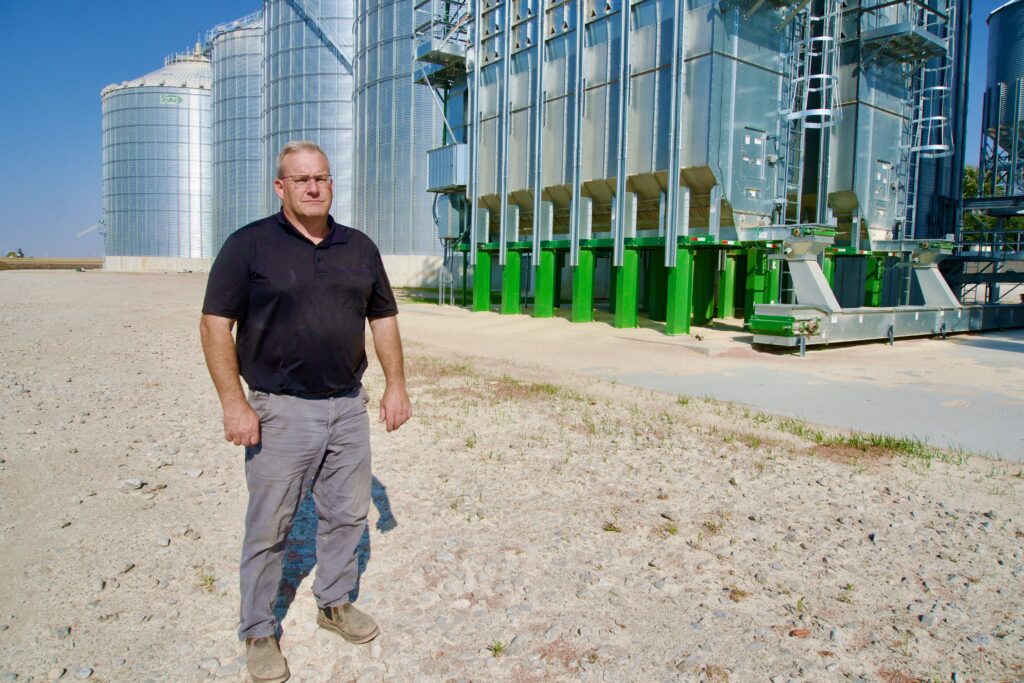
In an interview while harvesting soybeans in the cab of a John Deere combine 28-year-old Jack Fehr explained how his family disregarded the typical constraints to organic agriculture promoted by conventional growers and their allies in academia and industry – that converting to organic farming takes too long, costs more, yields less, and can’t be done successfully except on small farms.
Organic Generates More Revenue
“I talk to a lot of farmers,” said Fehr. “Their big question is, well, I don’t know if I can make it work? Well, you can make it work. We do. And we get a premium for our organic crops, two to three times what conventional prices are on average.”
Fehr said Clear Creek buyers pay up to $8 a bushel for organic corn and $22 a bushel for organic soybeans, twice the conventional market price.
Farming organically is a high wire act balancing the lower cost for supplies against the higher costs for labor. Fehr explained that the cost of production at Clear Creek Acres is comparable to costs of chemical agriculture.
On the saving side of the ledger are organic seeds that are priced less because they are not genetically engineered and not treated with chemicals to ward off insects and diseases. There is no cost for insecticides, herbicides, fungicides, and chemical fertilizers. Clear Creek applies lower cost hog manure to its fields for nutrients. And it uses chicken litter that it produces from a big, non-organic egg-laying chicken feeding operation that it owns on the farm.
The last piece of keeping production costs down for farming operations as big as Clear Creek are economies of scale. The farm and its neighbors have fleets of tractors, combines, trailers, and other equipment that they share.
Those lower costs are offset by the expense of overcoming the primary impediment to organic grain production – controlling weeds, especially in soybean fields. Most of Clear Creek’s 30 employees spend their summers in the fields cultivating and harrowing to kill weeds. They are helped by local residents and a 70-member crew of Guatemalan field workers, hired under a special agriculture visa program, who weed by hand and cost an average of $30 an hour in wages and expenses.
“We have a lot more equipment and our man hours, our labor force, are higher than with conventional farming,” said Fehr. “A big turnoff for the farmer looking to transition to organic is the amount of labor and time it takes. I’ve been in a tractor, in the field, farming since February 15 this year. I haven’t had a day off.”
Enthusiasm For The Enterprise
That hasn’t proved discouraging because Fehr and his five brothers recognize the interest in organic agriculture. The market for Clear Creek’s crops is growing. The number of organic farms in Iowa increased from 467 to 799 from 2011 to 2021, an average of 33 annually. Iowa ranks sixth in the nation for the number of chemical free farms, and first in organic corn and soybean production, according to the U.S. Department of Agriculture.
The Organic Trade Association, the industry’s principal trade group, reported that from 2008 to 2016 the amount of U.S. farmland devoted to the production of organic corn, soybeans, wheat, oats, and barley grew by over 20 percent from 626,000 acres to 765,000. Iowa and four other northern Midwest and Great Plains states accounted for 40 percent of the organic grain trade, a portion of the $63.8 billion in organic food sales in 2023. That amounts to 50 percent more sales than in 2015, according to a Federal Reserve study.
There’s a lot of market space to grow much bigger. Due to the increasing demand for organic meat, milk, and eggs not nearly enough organic grain is produced in the U.S. Imports of organic grain reached 1.3 million metric tons in 2023, four times more than in 2020.
Addressing that scarcity also will produce environmental benefits, particularly for water quality. There are no toxic chemicals running off the organic fields. And Cory Fehr, Jack’s father, asserts the four-crop rotation, the use of manure and chicken litter, and the farm’s cultivation practices improves the condition of the soil. That keeps more nitrogen and phosphorus from draining into surface and ground water, he says.
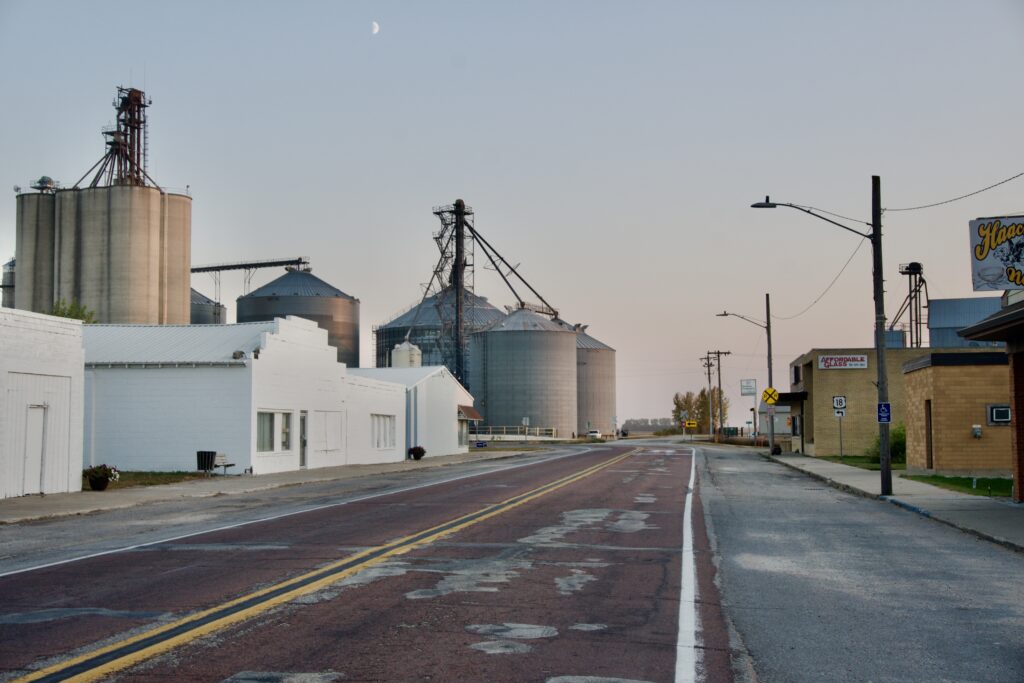
“I would say we have less runoff,” he said. “When we apply manure and litter we stir it into the soil right away. With it being organic, I think it attaches and doesn’t run off like the synthetic and commercial fertilizers.”
The Fehrs, though, don’t take water samples to test that assertion. “Until you measure it you don’t really know,” said Matt Liebman, professor emeritus of agronomy at Iowa State University and an expert in sustainable agriculture. “It’s a workable hypothesis that could be tested pretty easily.”
Does Organic Farming Affect Water Quality?
A team of researchers from the U.S. Department of Agriculture and Iowa State University have done that. They compared runoff from fields where commercial fertilizers were applied to fields and pastures fertilized with manure. The researchers found that conventional crop production drained nearly twice as much nitrate into water as the organic production. The authors of the study concluded that organic farming “can improve water quality in Midwestern landscapes.”
The interest in water sampling is keen in the two counties where the Fehrs farm. The area west of Emmetsburg, Palo Alto County’s largest town, has the highest number of waterways impaired by farm-related contaminants of any region of Iowa, according to the state Department of Natural Resources. But the parts of Kossuth and Palo Alto counties farmed by Clear Creek and other Fehr families lies south of the closest and lone impaired waterway in their area. It is Five Island Lake in Emmetsburg, polluted by phosphorus, which develops an annual toxic algal bloom in the summer.
Jeremy Thilges, a U.S.D.A. conservation specialist, said his office in Emmetsburg is overseeing a multi-year study of water quality in Five Island Lake and other surface waters to determine the causes and the sources of contamination.
The other facet of Clear Creek Farms that doesn’t attract nearly enough notice is how organic crop revenue assures that more generations of Fehrs will still be farming around West Bend mid-century and beyond. As he bounded from one task to the next in his pickup, dropping trailers in fields, adjusting the heat on grain dryers, checking on combines, Cory Fehr explained his goals for younger Fehrs this way: “What we’re trying to do is provide opportunity for them and all the people we’re able to hire,” he said. “If we were conventional farming we wouldn’t be able to support the families that we do.”
A version of this article was published by The New Lede on November 18, 2024
— Keith Schneider
